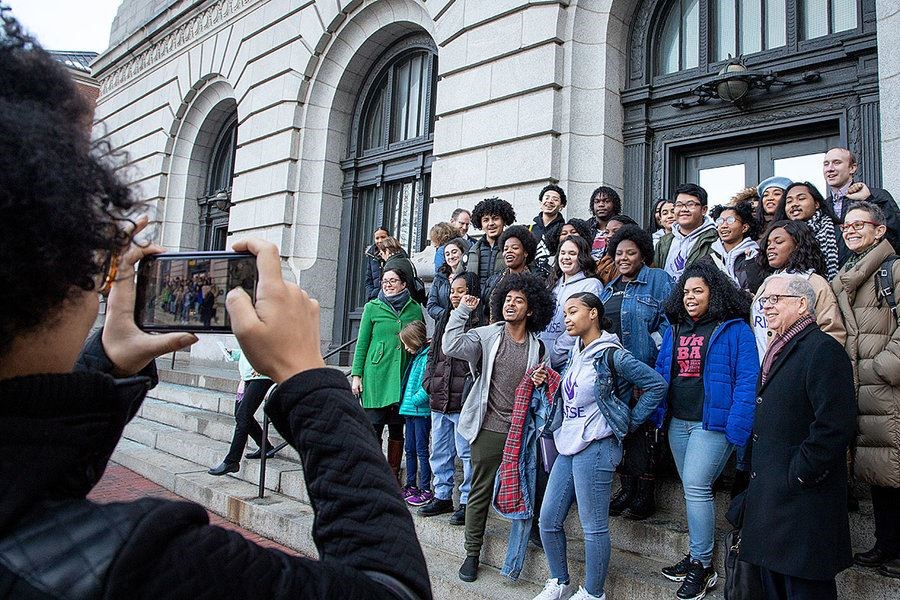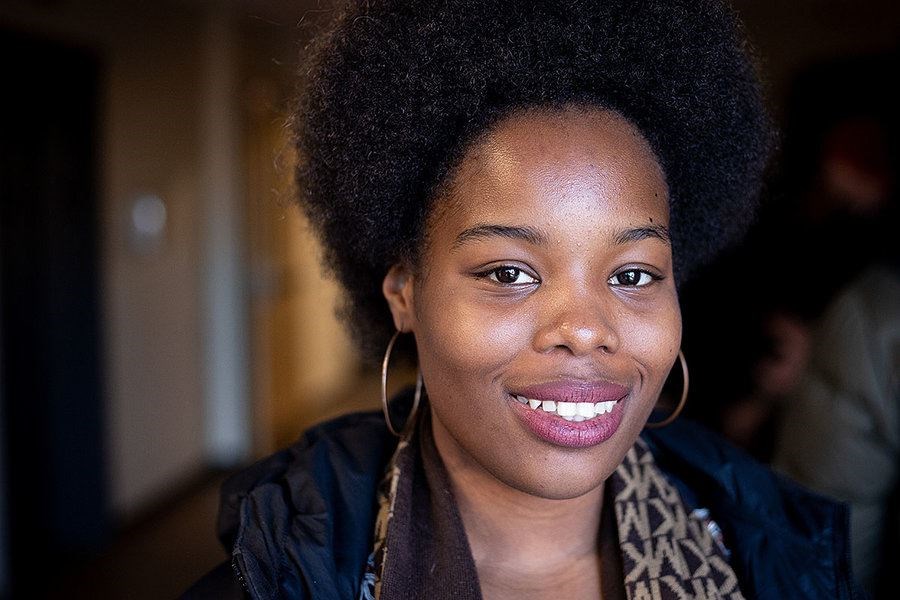Reprinted with permission from The Christian Science Monitor
Is access to education a right guaranteed by the Constitution? A federal case in Rhode Island, brought by parents and students, tests the ideals of equal opportunity and participatory democracy.
DECEMBER 12, 2019 - PROVIDENCE, R.I. - Last Thursday, the same morning that Speaker Nancy Pelosi announced that the U.S. House of Representatives would draft articles of impeachment, a federal judge began considering another matter with deep implications for the democracy: whether students have a constitutional right to an adequate public education to prepare them for civic life.
 Students, parents and lawyers cheer “Civics!” after a hearing in federal court on Dec. 5, 2019, in Providence, Rhode Island. Through a lawsuit, they hope to establish a constitutional right to an adequate public education that prepares students for civic life.Riley Robinson/The Christian Science Monitor
Students, parents and lawyers cheer “Civics!” after a hearing in federal court on Dec. 5, 2019, in Providence, Rhode Island. Through a lawsuit, they hope to establish a constitutional right to an adequate public education that prepares students for civic life.Riley Robinson/The Christian Science Monitor
As lawyers argued over moving forward to trial, dozens of teenagers crammed the gallery of the U.S. District Court here, with lead plaintiff Aleita Cook, a recent graduate of a Providence high school, observing from one of the armchairs normally reserved for a jury.
Fourteen named plaintiffs – students and parents – filed the class-action lawsuit, Cook (A.C.) v. Raimondo, against Gov. Gina Raimondo and other state officials last year. It argues that Rhode Island violates students’ constitutional rights by leaving many of them without key skills and knowledge to exercise such basic civic responsibilities as voting or jury duty.
If they win, the case could go down in history as the Brown v. Board of Education for their generation.
It goes to the heart of the relationship between education and the success of the American experiment. Like other fights over educational fairness, the plaintiffs root it in the struggle for civil rights and the nation’s long reach toward ideals of equal opportunity and participatory democracy.
“What I’ve learned as far as civics is, I guess kind of the presidents,” Ms. Cook says after the hearing. “I didn’t learn my voting rights through school,” she says. Nor was she taught about the balancing roles of the three branches of government.
On her own time, she says found her way to a youth activist group that has helped fill in some holes in her civics education. Now that she’s 18, she’s excited to be able to vote. But if students want to learn about civics in school, “it’s more in an AP [Advanced Placement] course rather than a required class,” she says.
Among the inadequacies noted in the legal complaint are that many immigrant students here are not taught English well enough to qualify to serve on juries once they become adults, and that low-income schools lack not only civics education, but also activities such as debate and student newspaper, the types of training grounds that wealthier districts typically offer. In Providence, schools were recently taken over by the state.
 Aleita Cook, a graduate of Providence public schools and the lead plaintiff in Cook (A.C.) v. Raimondo, spoke at a press conference following a hearing in federal court on Dec. 5, 2019, in Providence, Rhode Island.Riley Robinson/The Christian Science MonitorWhether the lawsuit succeeds or fails, for the youths involved, working with lawyers to build a case has already been the civics lesson of a lifetime.
Aleita Cook, a graduate of Providence public schools and the lead plaintiff in Cook (A.C.) v. Raimondo, spoke at a press conference following a hearing in federal court on Dec. 5, 2019, in Providence, Rhode Island.Riley Robinson/The Christian Science MonitorWhether the lawsuit succeeds or fails, for the youths involved, working with lawyers to build a case has already been the civics lesson of a lifetime.
“You’re really the national test case,” Michael Rebell, lead counsel and an education equity advocate at Teachers College, Columbia University, tells the students. “If we can win this, then all kids throughout the United States will have a federal constitutional right.”
Many states have redistributed education dollars in response to state-level court battles seeking justice for students in poor districts. Traditionally, education is a matter of state and local control, so it’s a big hurdle to persuade a federal judge to move forward.
The 6th U.S. Circuit Court of Appeals is considering similar questions in a lawsuit by Detroit students against Michigan officials for what they argue is a constitutional right to literacy.
The current case could boil down to how Judge William Smith interprets the 1973 Supreme Court opinion in San Antonio Independent School District v. Rodriguez. The 5-4 decision left the funding equity matter in the state’s hands and noted that the U.S. Constitution doesn’t mention education specifically.
Mr. Rebell told the judge Thursday that Rodriguez left an opening for future cases to show a link between an inadequate education and the ability to exercise constitutional rights.
Anthony Cottone, representing Rhode Island education officials, countered that Rodriguez closed the door on federal involvement. There is “no fundamental right to education under the Constitution,” he said.
Rather, Mr. Cottone argued, it is up to local school districts and the state legislature to determine educational standards and funding.
 June, a third grader and plaintiff in Cook (A.C.) v. Raimondo, attended the Dec. 5, 2019, hearing in federal court with her mother, Moira Hinderer.Riley Robinson/The Christian Science MonitorJudge Smith peppered both lawyers with questions. He brought up that only 14% of students in the U.S. were found to be top performers in reading in a recent comparison, the Program for International Student Assessment (PISA). The remaining 86% couldn’t distinguish between fact and opinion in complex texts, he said, asking Mr. Cottone whether that might raise reasonable concerns about the future of the democracy.
June, a third grader and plaintiff in Cook (A.C.) v. Raimondo, attended the Dec. 5, 2019, hearing in federal court with her mother, Moira Hinderer.Riley Robinson/The Christian Science MonitorJudge Smith peppered both lawyers with questions. He brought up that only 14% of students in the U.S. were found to be top performers in reading in a recent comparison, the Program for International Student Assessment (PISA). The remaining 86% couldn’t distinguish between fact and opinion in complex texts, he said, asking Mr. Cottone whether that might raise reasonable concerns about the future of the democracy.
Such concerns are valid, Mr. Cottone said, but federal litigation isn’t the solution.
(Neither of them mentioned that U.S. students outperformed the average of 9.9% of students globally who had mastered those complex reading skills. The Organization for Economic Cooperation and Development administers the PISA in 79 countries.)
One reason Rhode Island community groups have helped bring the federal lawsuit is that two lawsuits in state court to establish a state constitutional right to education have failed.
Plaintiff June, a third-grader with blond hair in a loose ponytail, sat in the jury box to observe with her mother, Moira Hinderer, and Ms. Cook. But the legal volleys couldn’t compete with her penchant for drawing, and she frequently ducked down to pluck colored pencils out of a purple box in her backpack.
“I have the privilege to have a job where I can take a half day off to take her to court and have a discussion about what a court is,” Ms. Hinderer says. “For a lot of families that’s just not reality. So the school needs to be providing an equitable experience where kids get what they need ... to know how you participate in a democracy.”
For many of the urban teens attending the hearing in the statue-flanked limestone Federal Building downtown, it was their first visit to a courthouse.
“The experience was really amazing,” says Jayson Rodriguez, a junior at the Met High School. It “pushed forward my desire to pursue the path of being a lawyer and to eventually understand the vernacular that these people are using,” he says during a pizza lunch with other youth organizers at the office of the Rhode Island Center for Justice, whose executive director, Jennifer Wood, is co-counsel for the plaintiffs.
Symone Burrell found her first court hearing exciting but frustrating. “It was really concerning to hear [the state’s lawyers] just keep stating the point that education was not a right. They just kept repeating it and repeating it,” says the community college student who is active with ARISE, a group that helps Southeast Asian youths. “It’s kind of scary that the people who are running our education think that way.”
It could take several years for potential appeals to play out, if Judge Smith allows a trial to go forward.
When it comes to civic preparation, “there are great philosophical disagreements,” with some civics advocates arguing schools should be more responsible and others “that it’s the job of home and community to develop the aptitude and values of citizens,” Kei Kawashima-Ginsberg, director of the Center for Information and Research on Civic Learning and Engagement at Tufts University, told education journalists at a conference earlier this year.
She also sees a need for “a long-term remedy that could address one of the fundamental issues in civic education, which is unequal funding,” she explains in an email.
The majority of states now require a civics course in order to graduate from high school, while Rhode Island and others address it only in broader social studies standards.
Rhode Island Department of Elementary and Secondary Education spokeswoman Meg Geoghegan writes in an email that the department “has established regulatory frameworks and supporting guidance to help ensure that social studies and civics are part of the curricula, but the responsibility for implementing these tools rests at the local level.”
Niamiah Jefferson, a youth activist from Cranston, says she’s been able to get decent civics education in regular and AP history classes, but only by attending a regional career-pathways high school in Scituate, where she is one of just a handful of African American students. “My parents sacrificed traveling 45 minutes each day for the past three years for me to go to that school,” she says. She hopes this case will help future students find such resources in their own communities.
Page created on 12/15/2019 10:58:03 PM
Last edited 12/15/2019 11:07:40 PM
